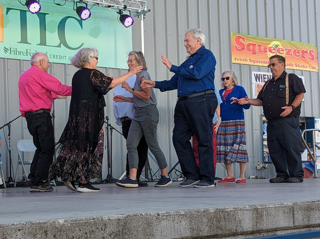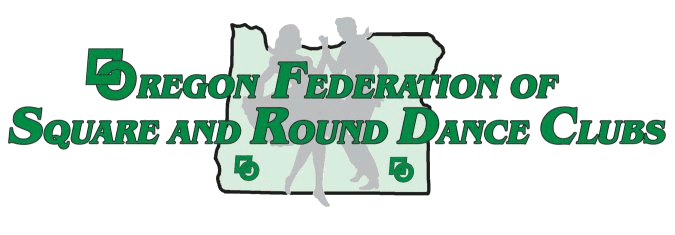
People Organization Documents
- Publications
- Minutes & Reports
- Past OFNs
- Constitution & By-laws
- Practices & Procedures
- Officer Nomination Form
- Randall Award Nomination
- Summary of Coverage
- Enrollment form, PDF
- Notification of Event
- Request Certificate
- Add New Dancers
- Submit Class List
- Report Accident Online
- Accident Report Form
- Past Summer Festivals
- Past Benefit Dances
- Past Fed. Presidents
- Past Randall Award
- Chairman's Trophy
- Wood Award

Square Dancing is the Official State Dance of Oregon
Miscellaneous Policies
The Oregon Federation of Square and Round Dance Clubs maintains an extensive policy and procedure guide, which documents in excruciating detail most of the procedures we use to conduct our meetings and our day to day business. However, there are many issues of interest to square and round dance clubs that do not necessarily merit the formality of being included in the P&Ps. This section lists some of those items.
What Is A Club?
What, exactly, is required to become and stay a member of the Oregon Federation of Square and Round Dance Clubs? The requirements are fairly simple to state.
- You must belong to a council.
- You must be incorporated.
- You must have 16 members.
- You must have liability insurance.
Each of those requires a little additional explanation. Each of our clubs is incorporated, mostly in Oregon, but some are incorporated in Washington or California. To be a corporation, you must have a Constitution or By-laws, and you must have a President and a Secretary (plus other officers, if your By-laws require it). In addition, you must pay the corporation renewal fee every year, currently $50 in Oregon. Also, all three states require that a corporation have at least one business meeting per year.
Although you must have 16 members in order to become a member of OFSRDC, the policy manual does not require that you maintain 16 members.
The Federation is able to provide low-cost liability insurance for its member clubs through United Square Dancers of America. Virtually every clubs in the Federation takes advantage of this offer, although some clubs have occasionally acquired their own. The Federation will accept your proof of insurance in lieu of participating in our policy.o
Note that your area council may have additional requirements, on top of those mandated by the Federation. Some councils, for example, require that clubs hold at least one public dance per year.
Travelling Clubs
Sometimes, when a club begins to dwindle, or is unable to acquire any new members but still wishes to remain as an entity, that club will stop holding dances on its own, and become a travelling club. Such a club visits other clubs, still wearing their own club badges, but does not have a home dance hall, and does not hold lessons or dances of their own.
The P&Ps do not recognize a separate classification for "travelling clubs". All of our member clubs are the same. Thus, the requirements for travelling clubs are the same as for regular clubs: you must remain incorporated, you must belong to a council, and you must have liability insurance. Note that the incorporation requirement means that you must have at lesat one business meeting per year.
As long as you stay current, you can stay a travelling club. However, one might ask what purpose such a club serves; if you are not holding dances and classes, you are not furthering the cause of square dancing in the public.
Banner Stealing
One of the more controversial and fluid topics in square dancing over the years is the issue of banner stealing. At one time, many years ago, it was common for a visiting to claim the banner of the club they were visiting, essentially holding it hostage until the hosting club scheduled a return visit to reclaim the banner. Indeed, 20 or 30 years ago, it was common for several clubs to lay claim to a banner, and elaborate rules existed to arbitrate between competing claims.
This practice seems to have faded away somewhat. Many clubs were miffed to have their valuable, hand-crafted banners stolen without their knowledge. Because of that, it is common today for a club to make smaller, souvenir banners, that are given to visiting clubs who lay a claim.
In reality, there are no rules to cover this situation. The Federation has never established a policy on banner stealing. Callerlab has issued some press releases about the practice, as has United Square Dancers of America, but they are merely descriptive, rather than legislative.
In addition, as the activity has shrunk over the years, clubs have grown much smaller, and it can be difficult to amass a large group for a visitation. As a result, a large amount of flexibility is required to cover these situations.
In general, the most common guidelines today seem to suggest that visiting with one square plus a caller, or two squares without a caller, should be sufficient to warrant the awarding of a banner. If a visiting club is very small, the hosting clubs needs to make allowances, so that one square without a caller might suffice.
However, banner stealing is supposed to be about fun and fellowship. Don't spend a lot of time debating and arguing about the rules. If a club claims they deserve a banner, give them one. It will be better for everyone.